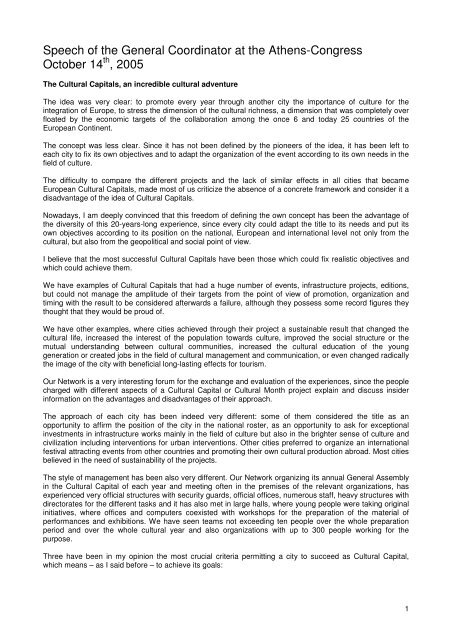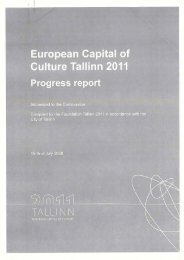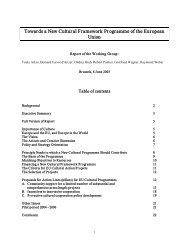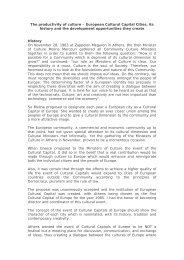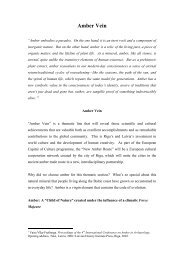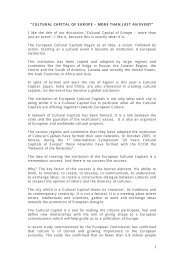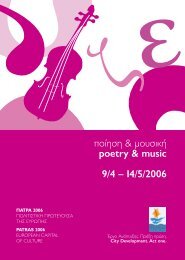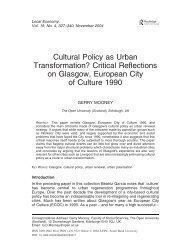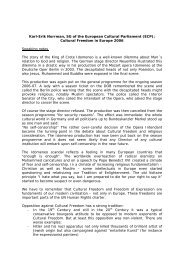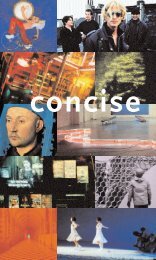Speech of Rodolfo Maslias october 14th 2005.pdf - Documentation ...
Speech of Rodolfo Maslias october 14th 2005.pdf - Documentation ...
Speech of Rodolfo Maslias october 14th 2005.pdf - Documentation ...
You also want an ePaper? Increase the reach of your titles
YUMPU automatically turns print PDFs into web optimized ePapers that Google loves.
<strong>Speech</strong> <strong>of</strong> the General Coordinator at the Athens-CongressOctober 14 th , 2005The Cultural Capitals, an incredible cultural adventureThe idea was very clear: to promote every year through another city the importance <strong>of</strong> culture for theintegration <strong>of</strong> Europe, to stress the dimension <strong>of</strong> the cultural richness, a dimension that was completely overfloated by the economic targets <strong>of</strong> the collaboration among the once 6 and today 25 countries <strong>of</strong> theEuropean Continent.The concept was less clear. Since it has not been defined by the pioneers <strong>of</strong> the idea, it has been left toeach city to fix its own objectives and to adapt the organization <strong>of</strong> the event according to its own needs in thefield <strong>of</strong> culture.The difficulty to compare the different projects and the lack <strong>of</strong> similar effects in all cities that becameEuropean Cultural Capitals, made most <strong>of</strong> us criticize the absence <strong>of</strong> a concrete framework and consider it adisadvantage <strong>of</strong> the idea <strong>of</strong> Cultural Capitals.Nowadays, I am deeply convinced that this freedom <strong>of</strong> defining the own concept has been the advantage <strong>of</strong>the diversity <strong>of</strong> this 20-years-long experience, since every city could adapt the title to its needs and put itsown objectives according to its position on the national, European and international level not only from thecultural, but also from the geopolitical and social point <strong>of</strong> view.I believe that the most successful Cultural Capitals have been those which could fix realistic objectives andwhich could achieve them.We have examples <strong>of</strong> Cultural Capitals that had a huge number <strong>of</strong> events, infrastructure projects, editions,but could not manage the amplitude <strong>of</strong> their targets from the point <strong>of</strong> view <strong>of</strong> promotion, organization andtiming with the result to be considered afterwards a failure, although they possess some record figures theythought that they would be proud <strong>of</strong>.We have other examples, where cities achieved through their project a sustainable result that changed thecultural life, increased the interest <strong>of</strong> the population towards culture, improved the social structure or themutual understanding between cultural communities, increased the cultural education <strong>of</strong> the younggeneration or created jobs in the field <strong>of</strong> cultural management and communication, or even changed radicallythe image <strong>of</strong> the city with beneficial long-lasting effects for tourism.Our Network is a very interesting forum for the exchange and evaluation <strong>of</strong> the experiences, since the peoplecharged with different aspects <strong>of</strong> a Cultural Capital or Cultural Month project explain and discuss insiderinformation on the advantages and disadvantages <strong>of</strong> their approach.The approach <strong>of</strong> each city has been indeed very different: some <strong>of</strong> them considered the title as anopportunity to affirm the position <strong>of</strong> the city in the national roster, as an opportunity to ask for exceptionalinvestments in infrastructure works mainly in the field <strong>of</strong> culture but also in the brighter sense <strong>of</strong> culture andcivilization including interventions for urban interventions. Other cities preferred to organize an internationalfestival attracting events from other countries and promoting their own cultural production abroad. Most citiesbelieved in the need <strong>of</strong> sustainability <strong>of</strong> the projects.The style <strong>of</strong> management has been also very different. Our Network organizing its annual General Assemblyin the Cultural Capital <strong>of</strong> each year and meeting <strong>of</strong>ten in the premises <strong>of</strong> the relevant organizations, hasexperienced very <strong>of</strong>ficial structures with security guards, <strong>of</strong>ficial <strong>of</strong>fices, numerous staff, heavy structures withdirectorates for the different tasks and it has also met in large halls, where young people were taking originalinitiatives, where <strong>of</strong>fices and computers coexisted with workshops for the preparation <strong>of</strong> the material <strong>of</strong>performances and exhibitions. We have seen teams not exceeding ten people over the whole preparationperiod and over the whole cultural year and also organizations with up to 300 people working for thepurpose.Three have been in my opinion the most crucial criteria permitting a city to succeed as Cultural Capital,which means – as I said before – to achieve its goals:1
1 The support and the harmonious collaboration <strong>of</strong> the political national andlocal instances involved in the project.Any conflict between political forces implicated in the event has a disastrous repercussion on the image andthe result <strong>of</strong> a Cultural Capital. We have seen even an example, where the regional authorities organized aseparate program competing with the events <strong>of</strong> the municipality. There have been also cases, where theconflictive relations between the involved political parts led to arrangements and compromises that had notthe success <strong>of</strong> the project as principal objective.In the contrary, we could admire examples, where all political forces, even from opposed parties, havecollaborated harmoniously and constantly supported the project, achieving excellent and sustainable resultsfor the city.2 The quality and competence <strong>of</strong> the artistic management.Most successful Cultural Capitals have been drafted by an autonomous artistic director and his personalteam coordinating, evaluating and adapting artistic contributions to a consistent general idea governing thewhole program. Inserting <strong>of</strong> any kind <strong>of</strong> proposals submitted without guidelines and without a central andconsistent philosophy <strong>of</strong> the project has never led to a success.Involving <strong>of</strong> the local artistic, cultural and intellectual potential <strong>of</strong> the city is also one <strong>of</strong> the important factorsfor the acceptance and the success <strong>of</strong> the artistic management.3 The adherence <strong>of</strong> the local population to the project and sponsorship.The title <strong>of</strong> Cultural Capital is always producing a high expectance among the population and the actors <strong>of</strong>arts and culture in the city and in the bride region. The political instances in charge <strong>of</strong> the organization andthe artistic team must give a high importance to explain to the local population and media, the goals and theprocedures chosen to achieve them. A lot <strong>of</strong> Cultural Capitals had to fight for years with the continuousdefiance <strong>of</strong> the local population fomented by the local media and were obliged to convince before or whilethey were working on the project. The level <strong>of</strong> acceptance has obviously a direct influence on the sponsoringand on the voluntarism in the city. The sponsoring is getting every year a higher importance, since thenational and regional budgets contribute less money to culture as in the past and the EC-contribution hasalways be a quite neglectable part <strong>of</strong> the project’s budget.The cities that could count on the synergy <strong>of</strong> these three factors have been the most successful.The lack <strong>of</strong> a concrete framework for the organization <strong>of</strong> a Cultural Capital and the diversity <strong>of</strong> the initiativesover the 20 years, makes a comparison between the cities, not only quite impossible but also unjust.This is why, the travelling exhibition that our Network has prepared to commemorate the 20 th anniversary <strong>of</strong>the Cultural Capitals and Months has a thematic approach highlighting some important projects on hand <strong>of</strong>examples <strong>of</strong> cities having achieved the best results in each specific field.To prepare this exhibition, that has been for some years now our main task, the members <strong>of</strong> our Networkvisited the cities and their archives and selected together with the responsible people the relevant materialand the exhibits that have been elaborated by our working group and the technical team to be presented in2006 in the current Cultural Capital, Patras, and in the other two past Greek Cultural Capitals Athens andThessaloniki, and to travel as from 2007 beginning from Luxembourg, to every Cultural Capital each yearand to some <strong>of</strong> the past Cultural Capitals and Months.Some <strong>of</strong> the most important fields <strong>of</strong> the different projects have been infrastructure works, such as concerthalls, theatres, exhibition halls. Some cities designed them for the needs <strong>of</strong> the cultural year, some othertook the title only as an occasion to improve the cultural infrastructure for he future and <strong>of</strong> course some citiesthat wanted to combine both, encountered timing problems with negative effects for the whole image <strong>of</strong> theiraction.In the same preoccupation <strong>of</strong> achieving long-lasting results, some Cultural Capitals founded culturalinstitutions like museums or yearly cultural festivals.2
In the last years, many cities concentrated their efforts on projects with a sustainable social impact, likebetter integration <strong>of</strong> foreign cultural minorities or artistic education for children, or even accessibility <strong>of</strong>cultural sites for disabled people.In order to exploit the international aspect <strong>of</strong> such a title, most cities organized a lot <strong>of</strong> internationalcongresses mostly on topics <strong>of</strong> cultural management and intercultural dialogue.Some cities tried to give a more permanent and international character to festivals or events they alreadyused to organize in specific fields <strong>of</strong> arts like cinema, jazz etc.Last but not least, a lot <strong>of</strong> cities saw in the Cultural Capital an opportunity to improve daily life and urbanstructure insisting on the aspect <strong>of</strong> civilization as one <strong>of</strong> the interpretations <strong>of</strong> culture.The policy <strong>of</strong> the European Union on Cultural Capitals has also shown periods <strong>of</strong> experimentation, withnegative results on the projects. The lack <strong>of</strong> continuity <strong>of</strong> the Cultural Months, the difficulty <strong>of</strong> making adecision on the Millenium-Cultural Capital that led to the failed experiment <strong>of</strong> 9 Cultural Capitals in the year2000, the possibility given to designated countries to suggest only one city obliging the European Union togrant the title independently <strong>of</strong> the opinion <strong>of</strong> its jury, the lack <strong>of</strong> monitoring procedures and the lack <strong>of</strong> anobjective evaluation by the European Institutions themselves on the basis <strong>of</strong> fixed criteria but also themodest subvention, have been in these 20 years some <strong>of</strong> the factors that have given to the Cultural Capitalsa less European character than they deserved as the most consistent and successful cultural event in theUnited Europe. The European Commission and the European Parliament have recognized the need <strong>of</strong> arevision <strong>of</strong> this policy and the new rules as well as the restructuration <strong>of</strong> the cultural services <strong>of</strong> theCommission themselves are in our view following the right direction and give to the Cultural Capitals the rolethey deserve in the overall European cultural policy.The Network <strong>of</strong> European Cultural Capitals and Months is disposed to play an important consulting role inthis new policy concerning the Cultural Capitals, <strong>of</strong>fering the concentrated know-how <strong>of</strong> its members and thepower <strong>of</strong> a constantly renewed think-tank regrouping the project-leaders <strong>of</strong> each year in every corner <strong>of</strong> theenlarged Europe but also outside the EU-borders, where the European model has been copied.To be able to <strong>of</strong>fer these services in a more structured way, the ECCM-Network is organizing this Fall itspermanent <strong>of</strong>fice and secretariat and documentation centre in the Cultural Centre built in Luxembourg by theoccasion <strong>of</strong> the 1995 Cultural Capital, it is joining the organizations <strong>of</strong>ficially recognized and financed by theEuropean Commission for their contribution in the field <strong>of</strong> culture and will <strong>of</strong>fer on the web a site with all theimportant documentation on Cultural Capitals, the material <strong>of</strong> the travelling exhibition, important contacts andinternational projects and also studies <strong>of</strong> scientists and students on Cultural Capitals. This site will be alsoaccessible through the cultural portal <strong>of</strong> the European Commission.As Co-ordinator General <strong>of</strong> our Network, I want to thank you for honouring our initiative to invite in Athensthe cultural networks and organizations in order to co-ordinate our action in favour <strong>of</strong> the interculturaldialogue and the respect <strong>of</strong> the cultural diversity and I hope that we shall take together positive initiatives fora fructuous co-operation that will unify our forces serving the same goals.<strong>Rodolfo</strong> <strong>Maslias</strong>ECCM-General Coordinator3


